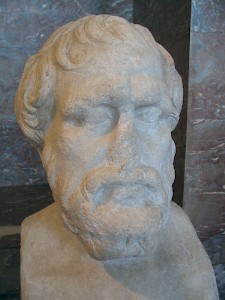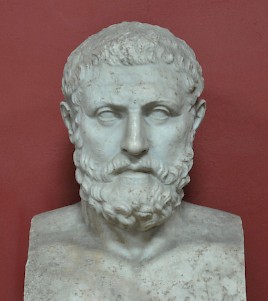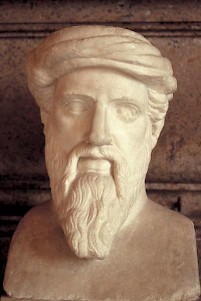Seven Sages
The seven sages: a group of semi-legendary wise people from the Archaic age, often regarded as the founders of Greek philosophy.

The idea that there had once been seven extraordinary wise people was probably introduced in the west from Babylon, where the seven apkallū were believed to have lived before the Great Flood. The first European to refer to a similar, yet less mythological tradition is the Athenian philosopher Plato (427-347), who mentions seven names of wise people that "were lovers and emulators and disciples of the culture of the Spartans":
Such were Thales of Miletus, and Pittacus of Mitylene, and Bias of Priene, and our own Solon, and Cleobulus the Lindian, and Myson the Chenian; and seventh in the catalogue of wise men was the Spartan Chilon.note

These people had lived in the seventh and sixth centuries and were later believed to have founded Greek philosophy. However, not everyone agreed about the names. The historian Ephorus of Cyme replaced Myson with Anacharsis, a legendary Scythian sage mentioned in the Histories of Herodotus of Halicarnassus (4.76-78). A generation after Plato, Demetrius of Phalerum, a pupil of Aristotle of Stagira, was not too happy with Myson either, so he replaced him with Periander, the tyrant of Corinth.
And this was only the beginning. Four names have become canonical (Thales, Pittacus, Bias, Solon), but there were many candidates for the remaining three positions. Diogenes Laertius, the author of the entertaining Lives of the Eminent Philosophers, mentions several writers who had included lists of seven sages in their books on the history of Greek philosophy, like Dicaearchus of Messene (late fourth century), Maeandrius of Miletus (early third century), and three authors whose names are not mentioned.
|
|
|
|
|
|
|
|
|
|
|
|
|
|
|
|
|
|
|
|
|
|
|
|
|
|
|
|
|
|
|
|
|
|
|
|
|
|
|
|
|
|
|
|
|
|
|
|
|
|
|
|
|
|
|
|
|
|
|
|
|
||
|
|
|
|
|
|
|
||
|
|
|
|
|
|
|
||
|
|
|||||||
|
|
|
|
|
|
|
||
|
|
|
|
|
|
|
||
|
|
|
|
|
|
|
||
|
|
|
|
|
|
|
||
|
|
|
|
|
|
|
||
|
|
|
|
|
|
|
||
|
|
|
|
|
|
|
That's sixteen names all in all, and that was not the end. Other lists are known to have included Pherecydes, Lasus, Aristoxenus, and Anaxagoras; still others included religious innovators like Orpheus, Linus, and Epicharmus. The grand total is twenty-three, of which Thales, Pittacus, Bias, Solon, and -to a lesser extent- Pythagoras were more or less universally recognized.

Most of these people are just names and in most cases, we cannot reconstruct their ideas. This was to be expected. The idea of seven sages who taught mankind is not without parallels in ancient legend, and many civilizations -including the Greek culture- believed that once, there had been teachers to help mankind. When the stories about the heroes of practical cleverness (e.g., Odysseus) were no longer convincing, new half-legendary heroes were needed, people who offered a more abstract wisdom.
The nature of these sages had to be sufficiently vague to remain convincing. It comes as no surprise that the philosophy of the seven sages was handed over in the form of brief maxims (gnomai) like "know thyself" and "nothing too much".
Real philosophy began later, but the age of the seven sages marks the beginning of doubt about older beliefs - and this doubt was of course the first step towards a better understanding of reality.